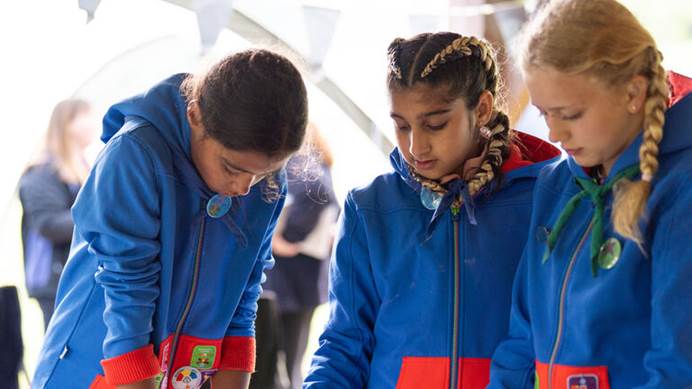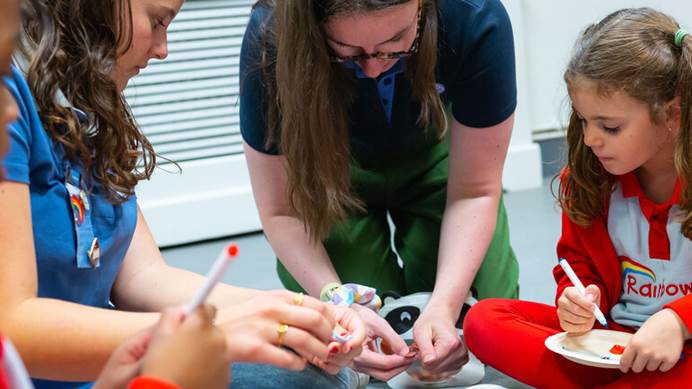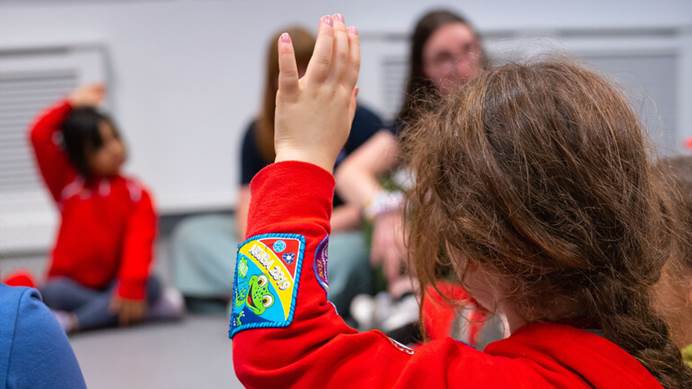Finance policy
What you need to do to manage accounts and funds
Approved: 25 September 2021
Version: 1
Content owner: Volunteer experience
This policy outlines responsibilities for all volunteers in Girlguiding who manage funds and keep financial accounts.
- Charity regulators within the UK – the government department or body which sets the guidance all charities are encouraged to follow. These are the Charity Commission for England and Wales, the Charity Commission for Northern Ireland and the Office of Scottish Charity Regulator (OSCR).
- Charity trustees – defined in law as ‘the persons having the general control and management of the administration of a charity’. At the unit level the leader, assistant leaders and leaders in training are typically the trustees, but could also include administrators who act as treasurers. For other levels it’s usually the voting members of a county executive committee and the members of a division or district committee who are charity trustees. Trustees have specific responsibilities under charity law.
- Financial year – the 12-month period used to prepare the accounts, such as 1 January to 31 December or 1 April to 31 March.
- End of year review – an independent review of a unit or level’s annual accounts. The type of review needed will vary depending on the unit or level’s charitable status and the amount of money that goes through the account in that year.
- Independent examination of accounts – In some cases, an end of year review is not enough, and there will need to be an independent examination of accounts. This usually takes place when there is more than £25,000 in a bank account, or when land or buildings are owned. If you're not sure if you need an independent examination of accounts, speak to your local commissioner.
- Bank account – we use the term bank account throughout this policy and it includes building society accounts.
- Signatories – These are the people allowed to operate a bank account. They may need to visit the bank and fill out a form called the account mandate.
- Volunteer expenses – payments that you have personally made which relate to your Girlguiding role.
- Reserves – money set aside to protect your unit or level against drops in income or to allow your unit or level to take advantage of a new opportunity.
- Assets – any valuable equipment, land, buildings or investments, as well as the cash or savings balance in the bank.
- Liabilities – something owed, usually a sum of money.
- ATM – Automated Teller Machine, often known as a cash point or cash machine.
- Debit card – a card that lets you spend money directly from your bank account. Usually you need a pin code to make a payment or withdraw cash, but many now offer contactless payment, currently up to £45.
- Credit card – unlike a debit card, a credit card doesn’t let you spend money directly from your bank account, but rather money that is lent to you by your bank. You then pay back the money in full or in instalments. Credit cards often have fees associated with them, such as interest, and other charges. Credit cards are not allowed unless you are a volunteer at HQ, country or region level.
- Prepaid card - a card where money can be loaded on (much like a pay-as-you-go mobile phone) and used like a debit card. Unlike a debit card, you don’t need a bank account.
- Payments in advance of a purchase – two signatories must agree that a given payment is to be made, before it is made.
- Payments at the point of purchase – only one signatory needs to make a payment at the point of purchase, for example, using a debit card at a shop. However, this payment must have been agreed by two signatories beforehand.
What rules do I need to follow?
Girlguiding units and levels including countries, regions and counties operate as individual charities. This means that everyone needs to follow their national charity regulator’s guidance about looking after finances.
Check your national regulator’s website for more information, as guidance in Scotland and Northern Ireland is different to England and Wales.
While parts of Girlguiding operate as charities, only some will need to actually register with their local regulator.
See our guidance on charitable status, or the relevant charity regulator’s website for your country.
If you guide outside the UK, ask for advice from your country or region office about how to apply this policy while also complying with local regulations. If you’re part of British Guiding Overseas (BGO), ask the BGO Chief Commissioner.
What are my financial responsibilities?
Unit leaders and assistant leaders are charity trustees. Trustees have a legal duty to look after their charity’s money, accounts, and other assets (for example, any valuable equipment, land, buildings, or investments). This includes:
- Keeping funds safe.
- Having a clear process for managing income and expenditure that your leadership team shares and understands.
- Setting a budget and following it.
- Dealing with and keeping records of money coming in promptly.
- Keeping records of any payments you make.
- Making sure accurate accounting records are produced, kept, and shared with the level above.
- Dealing with any financial challenges quickly.
- Reviewing accounts on a termly basis, if you have delegated the responsibility of keeping the accounts up to date.
Unit leaders, assistant leaders and leaders in training can delegate the day-to-day handling of money and keeping the accounts up to date to another person with the right experience and knowledge. But you’ll still be responsible for making sure they do the work correctly. Charity trustees have six key duties:
- Ensure the charity is carrying out its purposes for public benefit.
- Comply with the charity’s governing document and the law.
- Act in the charity’s best interest.
- Manage the charity’s resource responsibly.
- Act with reasonable care and skills.
- Ensure the charity is accountable.
There’s more information on the government’s website, and our trustee training webinars.
Bank accounts
All units and levels must have a bank account and keep the cash in hand they hold outside the account to a minimum.
You can open an account with any bank or branch, but they must be a recognised and well-known brand that’s part of the Financial Services Compensation Scheme (FSCS) and a registered banking organisation.
Your bank account must be in your unit or level’s name. Unit bank accounts can't be linked to another unit (for example, linking a new Rainbow unit account to an existing Brownie account) - but joint units may have a joint bank account.
You must have at least three named signatories (people needed to authorise payments) for your bank account. Only two of those three signatories need to agree and authorise all payments in advance of a purchase, but only one signatory needs to make a transaction at the point of purchase. You must never make a payment without another signatory approving it in advance.
Units should have two signatories from within the unit. The third signatory should ideally come from elsewhere, for example, your local guiding district or division – but signatories shouldn’t be related to, or in a relationship with, any of the other signatories.
If a signatory doesn’t already have a role in Girlguiding, you should record them on GO as a unit administrator. They must also have a criminal record disclosure check (DBS in England and Wales, AccessNI in Northern Ireland, PVG in Scotland), or the equivalent international check for BGO. They need to have done Girlguiding’s A Safe Space level 1 safeguarding training too.
You can use online banking and debit cards. But any transactions you make should follow your budget, and you must keep accurate records of your accounts (see below). One signatory can make a transaction as long as another local leader has approved it in advance, and the expenditure is recorded in your accounts.
Credit cards aren’t allowed (unless you are a volunteer at HQ, country or region level), and you mustn’t sign blank cheques.
You must share your bank account details with all members who need them, including the leadership team and your local commissioner. Make sure to include your bank’s name, your account number and sort code, the names of your bank mandate signatories and where you keep your bank’s associated documents and or cheque books. Cheque books, debit cards, and prepaid cards must be kept secure to prevent unauthorised usage.
The FSCS will protect funds of up to £85,000 in the unlikely event of a bank or building society failing.
If you’re outside the UK, ask for advice from your country or region office about how to apply this policy while also complying with local regulations. If you’re part of British Girlguiding Overseas, ask the BGO chief commissioner.
Setting and following a budget
It’s important to plan ahead to make sure you have enough funds to cover all your costs. Never spend more money than you can afford, or borrow from or lend money to your guiding accounts. This could have serious implications for both your guiding and personal finances. See the government advice on managing difficulties and insolvency in charities.
Your costs could include (but aren’t limited to) your annual subscriptions, venue costs, activities and buying equipment. You should include annual subscriptions and training, and you can include uniforms for volunteers as an expense. Units and levels should decide whether to do this on an individual basis and review their decision each year. Units can support leadership teams with membership fees and the costs of training and uniforms. Whatever decision is made, it should be recorded in the budget.
Units and levels can raise money through weekly, monthly, or termly subs, and by fundraising. You can also use money you have in savings or investments.
If you don’t have money set aside to cover drops in income, you should budget to create a reserve of funds. This will make sure you have enough money to pay for costs, especially fixed costs like rent, if your member numbers suddenly drop or there are delays in parents/carers paying subs.
Dealing with money coming in promptly
It’s vital that:
- You bank any money you receive as soon as possible.
- You keep any cash in a safe place, under lock and key. Your meeting place or household insurance policy probably won’t cover loss or theft of funds, and Girlguiding HQ’s insurance doesn’t cover assets belonging to units or other levels. If you regularly need to hold money securely, you should consider taking out additional insurance cover either by adding it to your own household policy or taking out a separate insurance cover for it.
- You keep Girlguiding funds completely separate from your own money.
- You minimise the amount of personal money you use to cover guiding expenses.
Keeping accurate accounts
You must record all money paid to you and money you spend. You can use a method that suits you, whether that is an accounts book or the accounts pack. But if you need to submit your accounts to your charity regulator, you should check their accounting requirements. All units and levels should check with their local commissioner what their local accounting period is, as it may vary in different areas.
It’s important to keep your records secure. Password-protect electronic documents and keep physical documents under lock and key. It’s best practice to make sure your accounting records are up to date by reviewing them at least once a term.
Unit leaders must review the accounts themselves termly if they’re delegated to a unit administrator who manages finances (unless you’ve made an alternative arrangement within your unit leadership team). Unit leaders must also make sure that anyone managing unit accounts who isn’t a member of the unit leadership team is registered on GO as a unit administrator, and has a criminal record disclosure check from the relevant disclosure body.
Accounts for all other levels should be reviewed regularly at district, division or county executive or committee meetings.
You need to keep all paperwork connected with managing your accounts for seven years following the end of each financial year.
End of year review
At the end of the financial year the Trustees must finalise their accounts. This means that at a minimum you must:
- Produce an annual accounts statement.
- Produce a statement of assets and liabilities.
- Have your accounts independently reviewed.
All levels must send all this information to their local commissioner no more than three months after the end of their financial year. If this isn’t possible you must contact your local commissioner and discuss it with them.
Units and other levels in Scotland and Northern Ireland must check with their country/region offices to find out if they need to submit a more detailed annual accounts statement. You can find more about this from Girlguiding Scotland and Girlguiding Ulster.
For units and other levels in England and Wales your commissioner can advise if you need to have your accounts independently examined. This is different from a year-end review and will depend on the amount of money held in your account, or any property or assets held.
Whilst it's the responsibility of commissioners to ensure that each unit in their area has its accounts independently reviewed by someone outside of the year unit once a year, making sure that units are keeping their accounts up to date and providing regular support to the leaders is a task that commissioners can delegate. However, commissioners must escalate any concerns they may have. For further information on commissioner responsibilities, see our responsibilities for unit accounts guidance (PDF)
If you’re guiding outside the UK you can ask the relevant charity regulator or your country/region chief commissioner if you need to submit more detailed information. BGO, including Branches, should ask the BGO chief commissioner.
Find out more about end of year accounts.
Claiming expenses
Our volunteers should never be out of pocket. If you have costs related to your volunteer role at Girlguiding, you must always claim them back.
If you pay for something for guiding from your own money, you need a receipt, travel ticket, invoice or bill to claim it back. Another trustee from the same level must authorise all expenses. You should claim back any expenses as soon as possible.
Before making a purchase which will later be expensed, you must make sure that this can be covered by the funds held by the unit or level.
Find out more about claiming expenses.
Dealing with financial challenges quickly
It’s crucial to act quickly if you think your unit or level doesn’t have enough money to cover all its expenses, or you’re having difficulty in keeping the records up-to-date, or if you are worried in any way.
At unit level you should get in touch with your local commissioner. They’ll be able to support you in finding solutions and other volunteers who can help you and your unit. You can also contact [email protected] if you have any other queries.
Other levels should escalate any concerns to the next level in the first instance, and commissioners at a county or region level should contact Girlguiding HQ.
If you suspect Girlguiding money is being misused, contact your local commissioner or Girlguiding HQ immediately at [email protected]. They will handle the concern in line with our Managing concerns about adult volunteers policy.
Gift Aid
You can claim Gift Aid on members’ subscriptions and on donations you receive, depending on Her Majesty’s Revenue and Customs’ (HMRC) rules. You will also need the person giving you the money to sign a Gift Aid Declaration.
We encourage all units and levels to claim Gift Aid each year from HMRC as it’s useful extra income. Units and levels in Scotland and Northern Ireland must be registered with their charity regulator to claim Gift Aid.
Please note that claiming Gift Aid is appropriate only where the parents and carers who pay the subscription also pay income tax.
Managing finances for overseas trips
For overseas trips you may want to use a prepaid card, sometimes known as a ‘cash card’. This is safer than carrying cash, and it may save you money on foreign exchange fees and exchange rates.
When picking a prepaid card you must make sure the provider is registered with the Financial Conduct Authority, and be aware that money on the card is unlikely to be protected by the Financial Services Compensation Scheme.
When setting up a prepaid card, you must follow this policy as you would for a bank account or debit card. This includes having at least three signatories, budgeting and keeping accurate records of accounts.
Prepaid cards are accepted by most ATMs and businesses that accept card payments overseas. You may not be able to use a prepaid card for transactions that need pre-authorisation, such as hotels and car hire deposits, and some fuel stations.
If you guide outside the UK, ask for advice from your country or region office about how to apply this policy while also complying with local regulations. If you’re part of British Guiding Overseas (BGO), ask the BGO chief commissioner.
Fundraising income
You need to keep a separate record within your accounts of all money you make through fundraising, including the purpose of the fundraising, and apply all the actions above to this money.
For more about the rules of fundraising for Girlguiding, take a look at our Fundraising policy.
Lending money
Lending money is allowed at district level and above. For example, lending a unit money to cover unit membership fees. If money is lent, documentation and transparency is essential as per the section 'Keeping accurate accounts' and 'End of year review'






